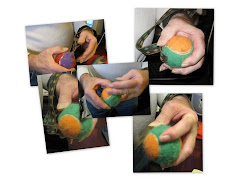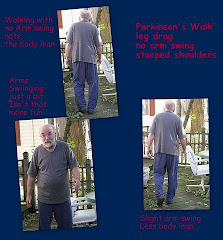WHOSE OLD FATHER ATE BEANS ?
I have PD, so that would be me for vegetable protein
Over the years my wife has said that I should be doing vocal exercises to relax my throat. She's very aurally sensitive and one of the things that she always liked about me was the sound of my voice. Not necessarily what I said but she did like to hear the music.
Even before I was diagnosed with PD, she was always suggesting a very simple vocal exercise to open my throat when I was tense or tired. The result she sought was that my tones would deepen and the music that she heard would resume.
Although I understood why she was making the request, I never considered that her years of theater and her minor in speech therapy made her anything more than just my wife. But I would humor her and do a few riffs of the exercise and when I spoke again, she could hear the results. So she was happy and I was happy because she stopped bugging me.
She's starting up again. The exercise is very basic and I will pass it along. You can do this without the Lee Silverman Voice Training Foundation and all you need are two or three clean fingers, clean because you'll be putting them in your mouth.
The problem is that the next thing she's going to make me do is to read to the dogs. This is to help me lose the monotone and restore expression in my voice, she tells me. She's giving me a choice from Lewis Carroll: Alice in Wonderland or Through the Looking Glass both favorites with her family who often gleefully exchange passages over dessert at family dinners. She says, however, that in lieu of Alice, I can read any Dr Seuss book of my choice to the dogs and cats. She feels that this will help to release the monotone and give me quality time with our four-foots (who might be just as happy with edible treats.) I can, of course, continue to read to her but she wants jokes or things that really interest me. She says this demands more emotional response on my part than just predigesting the news for her as I have over the years. Reading aloud with feeling is an excellent vocal exercise for PD.
With Parkinson's one of the first areas of symptom identification is decrease of laryngeal function leading to problems swallowing and problems communicating due to loss of volume and inarticulation. So the PD patient speaks softly, doesn't enunciate as well and, of course, more often than not speaks in a monotone. Family and friends can compensate for the movement difficulties but it is harder to compensate for the communication shut-down.
At this point I can still enunciate well but sometimes when I am tired or feeling "off" my voice pitch goes up quite a bit and someone turns down the volume. She says that we are lucky that communication isn't a real problem yet and that we still have time to work on this muscle relaxation technique. I know that the DynaCirc CR does help my voice and my swallowing so my instinct has been to duck the exercising but she won't take "No" for an answer. So I'm going to be doing the following exercise several times a week and I will report on the results in a month.
Insert two or three clean fingers - depending on the size of your fingers and the size of your mouth. I suggest beginning with two fingers held vertically. Grip them with your teeth if necessary but not to the point of pain.
Now repeat after me: ooo O aah A eee.
Those are the vowel sounds in the mnemonic, "Whose old father ate beans?"
You can begin slowly and distinctly. Let each breathy sound linger.
There is also a breathing pattern here: you are expelling air on ooo, breathing in on O, breathing out on aah, in on A and out on eee.
Continue to repeat the exact sound group and as you do, gradually increase the speed until the sounds elide.
By this point all sounds will be on one breath. This will force the muscles to really work.
Eventually you should turn up the volume.
What you will notice, herself tells me, is that these sounds are not formed on the tip of the tongue, the teeth or the lips (which by the way is another helpful exercise if you are not speaking clearly, because it is good for the consonants) but at the back of the throat. And that is the exact area we are trying to reach. That is also why you use those fingers to keep your mouth open and to force the sound from the depths.
Each sound cluster is important and leads to the next cluster. After a few minutes, stop, clear your throat if nessary, breath deeply, exhale deeply to relax, inhale and speak. Listen to your voice; hear anything different?
You might want some more technical reading about the problem and I am including a link for that as well.
http://www.emedicine.com/ent/topic797.htm















Great post and information. The photos really help. I'll be trying the voice strengthening exercise as my dear hubby is always fussing that he can't hear me.
ReplyDeleteThanks!
Thanks for the info about swallowing and speech. I just started about 1 month ago having swallowing issues begin. So, the idea of exercises to keep it in shape was intriguing. Also, the pictures of practicing arm swing was a great idea. I need to consciously start moving my arm when I walk to get back into the "swing of things." Take care... my blog is mypdblog.blogspot.com
ReplyDeleteThanks for the great info. I will begin trying this tonight!
ReplyDeleteJust to let you know I came here too.
ReplyDeleteVery useful info... thanks a lot. How far this exercise will help out in person with PD having difficulty in swallowing liquid and gets cough while taking liquid and food.
ReplyDeleteIt will be great if i get more information on this and exercise steps with picture.
Thanks
Jai
Thank you all for your comments.
ReplyDeleteTo Jai, We will take more photos of the step by step mouth positions and add them to this article.